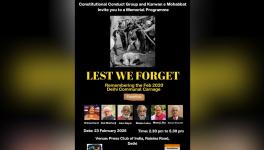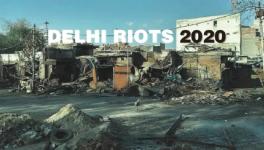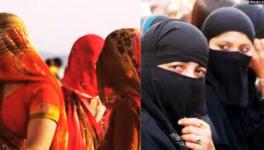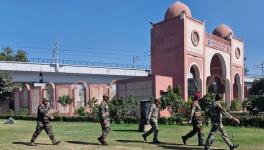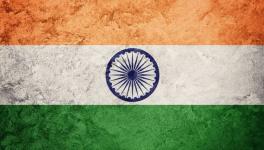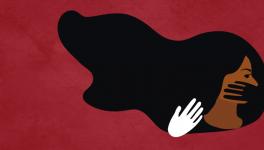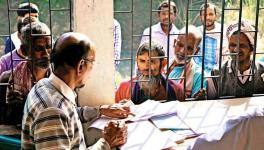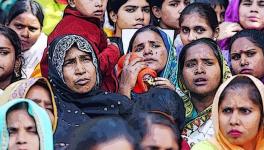Listening to Voices: How Kabul Became “Heroine” of a Book
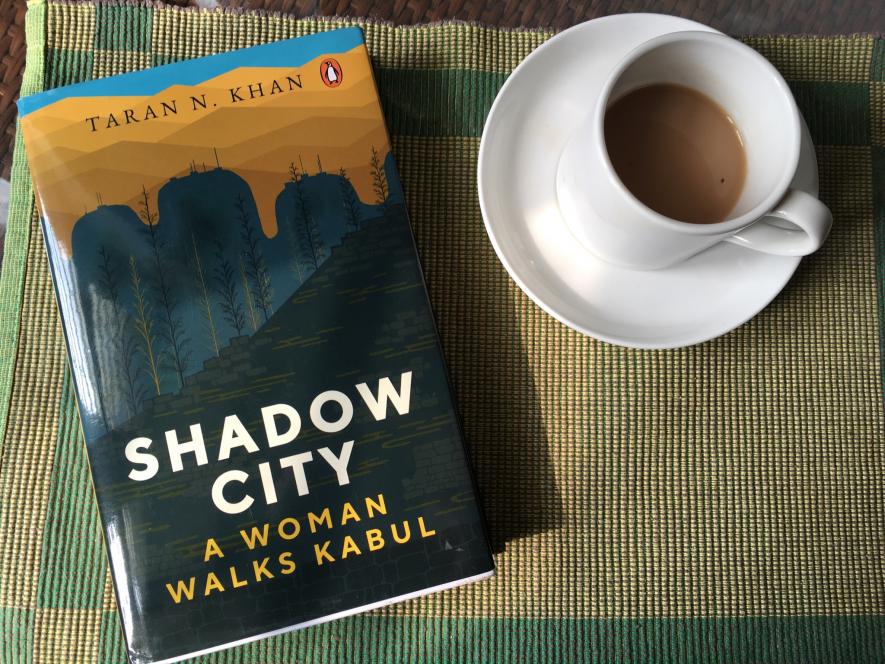
A close-up of Taran N Khan’s debut non-fiction title Shadow City: A Woman Walks Kabul.
Taran N Khan is a Mumbai-based independent journalist and writer. Between 2006 and 2013, she visited Kabul on media training assignments. Her writing has been published in Guernica, Al Jazeera, Caravan magazine, and Himal Southasian, among others. Her book, Shadow City: A Woman Walks Kabul, was recently published by Penguin Random House. In this exclusive interview with Meher Ali, she talks about Kabul, her struggle to write about the city in the way that she wanted to, and what walking means to her as a writer.
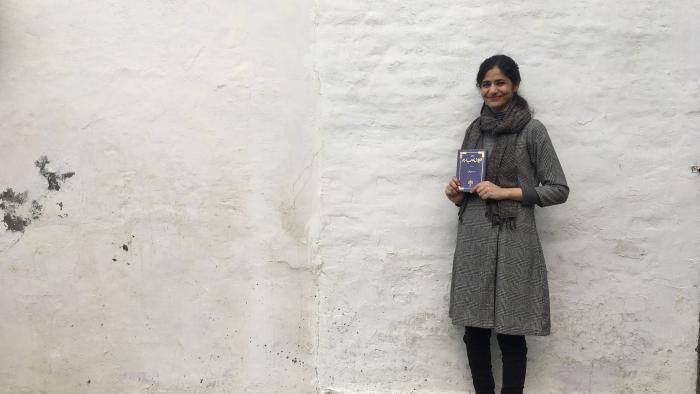
Taran N Khan with Mirza Ghalibâs book of ghazals, Diwan-e-Ghalib, from her grandfather Syed Mohammad Mehdiâs collection, who was an important resource for her as she was writing this book.
Did you go to Kabul with the intention of writing a book?
I didn’t go with the intention of writing a book at all. I went there to work with Afghan media professionals. So I was working there with Afghans and they were actually the process. They opened many stories for me, introduced me to their families and friends, and took me around the city, and it was through them that I found these stories that grew into this book.
I started trifling with the idea of a book sometime in 2011. I had already been writing for different publications [such as The Hindu and Gulf News], and the longer I spent there, the more it seemed like these stories were scratching the surface of something bigger. So I started writing longer, more reflective pieces and then it became clear to me that maybe there’s a book. I think I was trying to see what it was that I could say that would be useful, true to myself and also true to what I had seen in the city. At the same time, it had to be something that made sense to readers as well.
You write “War...ebbed flowed and what people learn to watch out for was how it affected them.” You say this in reference to Afghans, but how did the violence that you saw or heard about affect you? And how did you keep safe in Kabul?
As a journalist, I’ve been around people or places that have been affected by violence. At the same time this was a completely different experience, not just of conflict, but of prolonged signs of war. It made me aware of how people can be aware of the beauty of the everyday or of their humanity or of simply doing things that are kind because they understand that things can change so quickly and how fragile this entire equilibrium is.
What I learned the first time I went was to trust the people around me; my Afghan friends and colleagues were my survival kit. For instance, when I had gone on a film shoot, I wanted to stay a little longer but the person driving us [her and her husband Asad Hussain, who accompanied her on these trips] said that we should leave. I was a little unhappy because I wanted to get more for my story but on the way back [to Kabul], it started getting dark really soon, and it felt like we had done the right thing by listening to him. And I remember thinking that these were voices I should be listening to, simply because they are people who live there and understand it [Kabul] in a way that I really couldn’t.
Your Afghan friends and colleagues share some deeply personal stories with you. What was the process of crossing that threshold from daily interactions with them to them sharing their life stories with you?
I felt like people let me into their lives, not easily, but quite generously. In [some] cases we were sharing a living space, so a lot of conversations happened very naturally but with other, more formal interviews, it was clear I was there as a journalist. With others, our relationship just grew and then when I started writing the book, I said, “Well, this is what I’m doing. Is it okay with you?” And they said, “Sure.” So they became a character.
Also, I went to Kabul with a sense of cultural connection and I think it was this emotion of affinity which was nice for people [to see]. And I think it framed a lot of my interactions; it framed the way I saw Kabul for sure. I think people were also welcoming because I was teaching and working with them, so that was definitely extremely important in getting that kind of access and openness.
How did you decide what to write about?
The big process or stumbling block for me was [her saying to herself]: “You’re writing about this place, but there’s so much going on now and you’re only writing about what’s already happened.” There was this constant need or pressure to update. And I had to think about that quite deeply and ask myself: “Well, is this a book about news? Is this a book about current events?” And the answer was “no”. So then I could say, well, then that’s fine. I don’t have to constantly worry about making it relevant or updating it according to the news cycle.
Once I had that decision down, it became very easy for me to be able to decide how to shape it or decide what went into it. And it wasn’t like a list of issue-based or relevant topics or what people wanted to know. I could move away from that very happily and get into the things that I really enjoyed. In that sense, it was an indulgence. I just wrote about what I found moving or interesting or revelatory. My big concern was to be able to find a way to talk about this city [Kabul] that did some justice to what I had seen. That was really my big mission.
Was there pressure to write about Afghanistan or Kabul in a particular way?
There is a tendency to be very romantic about Afghanistan. As I’ve said in the book, there are two well-worn cliches that one tends to encounter: one is that it is a place of war and the other is that it is a place of noble suffering, like these people have suffered so much but they are still so wonderful and have hope despite everything. I have a discomfort with both these positions but at the same time life is somewhere in between these two positions. So this is what I’m trying to interrogate, this romanticizing of the suffering of people. The key for me then was to get into people’s stories.
There was quite often pressure to make the book more clearly about the reporter but I wanted to focus on the city. My instinct was to not talk about myself. So I knew that I didn’t want to do a memoir or a purely journalistic account of Kabul; there is enough about journalists going to Kabul. And I was very clear that the heroine of this book is Kabul.
And your book is about walking in Kabul and the stories that you gathered along the way. What does walking mean to you and does it help you with your writing?
I live in Mumbai and it’s becoming harder to walk there. On the road outside my house, there is construction work, pavements are being encroached upon or being reconstructed. Unfortunately, I think Indian cities are not privileging pedestrians. And I would like to walk more often. Walking does help a lot with writing. I think it's instinctive for me to be able to think through things by moving my body and to be outdoors and have the freedom to wander or take detours. And so many writers have talked about the link between writing and walking. For me, it’s become something of a standard; whenever I get stuck, I like to take a walk. In Pune, where I wrote part of the book, I was agonizing one day over something. There was a cafe that I used to go to in the evenings to have coffee, and they had become sympathetic to my pain. [Laughs] So the owner asked how it was going, and I said, “I’m really in a bad place today.” And she said, “Why don’t you take a walk on that tekri—hill?” So I said “theek hai—alright” and went up—it was a nice evening—and sat for a bit and when I came down, I had resolved the difficulty. So that was one of those magic or rare moments that come when the revelation is just up the hill.
Some of my favourite parts in the book were your conversations with your grandfather, Syed Mohammad Mehdi, whom you call “Baba”. In one such discussion, your grandfather invokes verses from poet Muhammad Iqbal’s Tarana-e-Hind, popularly known as “Sare jahan se achcha”, to speak about the idea of home and exile. What does this word mean to you?
I think for me personally, it’s a place of where you feel understood and safe and where you have this deep sense of belonging, where you can be of it and contribute to it. I think it’s a very instinctive thing. It’s also an echo that I find in several other places and that I found in Kabul. Home is also my grandfather’s voice telling me stories about cities. Home is also poetry. Home is also listening to friends in Kabul tell stories about their city and finding in their stories memories of my family talking about their imagined home. So it’s a pretty fluid concept. And I think part of the reason why this book took the shape it did was because this whole idea of home was fairly difficult [to define] at the moment when I was writing this, which was during the [2015] refugee crisis. [According to the latest—January 2019—UNHCR data, Afghans were the “most common” nationality seeking asylum through the Mediterranean land and sea routes, comprising 21.3% of the total number of asylum seekers, followed, at 16.9%, by Syrians.]
You talk of absences in your book and there is a very touching passage where you reflect on what absence means in reference to your grandparents. Can you talk a bit about absence? Is it difficult to capture in writing?
I think the key with them [her grandparents] was that I was always trying to see what they are like without me, here is what their lives are when I’m not there, and this is how I’m going to find them when I come back. Except that the last part is obviously not true. I mean, it’s sad. In fact today [January 2nd] is the day my grandfather died. He died very soon after my grandma. And it was obviously very painful to see him without her. It took me a while [to write about them]. And, of course, only in service of how it connects to this idea of absence. But I felt it spoke to something that was universal and connected to the idea of Kabul, which is so much defined by absence that sometimes that’s the only way you can describe the reality—by describing what is gone. And, in my grandparents’ case, knowing what they meant to me, as a person, as a writer, and then seeing that they are gone is the thing.
As I read your book, I was also reading articles about Indian Muslim women, among others, protesting against the Citizenship Amendment Act (2019) and the National Register for Citizens (NRC). And I found their portrayal as some kind of saviours or revolutionaries quite problematic. It made me reflect on how your book does the task of complicating such simplistic narratives and inviting the reader to dig deeper into the reality of life in Afghanistan.
You heard so many stories and chatter about they [Afghans] being saved and then there was, of course, the whole idea of Afghanistan being saved from the Taliban. That was kind of the overarching narrative at the time, and you can see why it’s a pleasing narrative. But, of course, the minute you start interrogating it, nuances appear. And that is something you can apply across contexts. If you think about the narrative around Indian Muslim women, it’s not really new. They have been portrayed in fairly simplistic ways for a long time. Where I think we are [now], it’s interesting to see that there is no single ownership over this voice. I think that's nice. That it’s a contested space now, more than earlier. And there is space for differing voices to come up and for people to argue from across the spectrum, and especially for Indian Muslim women to speak for themselves. And again, “Indian Muslim” is not one thing, it’s many things. I think the key is intention:hat is the intention with which you enter this dialogue? Is it to inform? Is it to patronise? Is it to claim ownership over this as some kind of political or cultural capital? Is it to understand? Are you coming from a place of empathy? This is really key for me. I find a lot of desire to sit and listen.
In the book, your relatives don’t understand why you want to keep going back to Kabul? So why did you keep going back?
I kept going back because I really enjoyed the energy that was in Kabul at that time. A lot of people I met had this hunger to learn [Khan also taught video production] and I was learning so much from them; it was definitely a two-way process. It felt like I was contributing. I met young film-makers who were making short films and documentaries. They were working with very low budgets and often had day jobs. They were so passionate about cinema or about telling stories that they—with whatever resources and time that they had—would just keep making films. I thought those films were incredible because they had this quality of intimacy and fluency with the city streets. And they would share this knowledge amongst each other. And because they weren't any proper film schools or anything, they would just watch films together, talk about films, seek out people who could give them resources. So it was a very special feeling to have been there at that time and see this kind of commitment to the work.
Also, Afghans—or the people I met—had this incredible flair for oral storytelling because you listen to stories so much in that culture and in our culture as well. And working with women was a lot of fun because they had these amazing stories that they wanted to talk about. One of their groups made this film about their relationship with the chadori and how that changed over time. It was being part of fun stuff like that…that is my abiding memory of Kabul: of it being a lot of fun.
Meher Ali is an Aligarh-based independent journalist and the recipient of the 2016 RedInk Award for human rights reporting. Her work has been published in Himal Southasian, The Wire, Marg and community media organisations TwoCircles.net and Citizen Matters.
Get the latest reports & analysis with people's perspective on Protests, movements & deep analytical videos, discussions of the current affairs in your Telegram app. Subscribe to NewsClick's Telegram channel & get Real-Time updates on stories, as they get published on our website.









